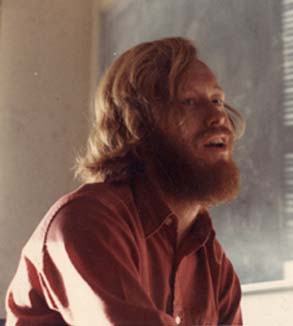
Robert Edward Bowen
 المؤلف:
C P Auser, M Hirsch, D E Osterbock
المؤلف:
C P Auser, M Hirsch, D E Osterbock
 المصدر:
Biography in Dictionary of Scientific Biography
المصدر:
Biography in Dictionary of Scientific Biography
 الجزء والصفحة:
...
الجزء والصفحة:
...
 5-4-2018
5-4-2018
 1043
1043
Born: 23 February 1947 in Vallejo, California, USA
Died: 30 July 1978 in Santa Rosa, California, USA

Robert Edward Bowen was known as Rufus Bowen because of his red hair and beard. He attended school in Fairfield. He wrote his first mathematical paper at the age of seventeen and, by the age of twenty-one, he had published five papers. He was twenty-one years old when he married Carol Twito in 1968. They had no children.
Let us look first at these early papers by Bowen which were on graph theory. His first publication was in 1964 in the Mathematical Notes of the American Maths Monthly. In 1966 he published On sums of valencies in planar graphs in the Canadian Mathematical Bulletin. This three page paper simple bounds (using Euler's polyhedron formula) for the number of edges in the sets obtained when the vertices of a planar graph are partitioned into two sets. In the following year he published two papers: The generation of minimal triangle graphs and Generations of triangulations of the sphere. The first Bowen defines a type of graph, a minimal triangle graph (MTG), obtained by putting together a number of triangles. He then gives all MTGs up to isomorphism with less than 14 vertices. These were generated using a computer program. The second paper, written jointly with Stephen Fisk, again uses a computer program to generate all the triangulations of the sphere with up to 12 vertices.
Bowen was awarded a degree by the University of California at Berkeley and obtained a doctorate there in 1970. In the same year he was appointed to Berkeley becoming a full professor there in 1977. Even before that he gave an invited address to the 1974 International Mathematical Congress in Vancouver, see [2] for the text of his lecture.
Dynamical systems theory had been started by Poincaré in the 1880's. Bowen's doctoral thesis Topological Entropy and Axiom A, supervised by Stephen Smale, was on this topic and he continued to make major contributions to dynamical system theory, building on the work of Poincaré and Gibbs. Bowen extended Gibbs' work on invariant measures associated with dynamical systems. He developed methods in symbolic dynamics originally due to Hadamard and Morse.
In 1975 Bowen published Equilibrium states and the ergodic theory of Anosov diffeomorphisms in the Springer Lecture Notes in Mathematics Series. L A Bunimovic writes in a review:-
This book is devoted to studying the properties of continuous and smooth dynamical systems some of whose trajectories are asymptotically exponentially unstable. There are two fields of applications of ergodic theory for the exploration of continuous and smooth systems. First, it is used for the study of properties of almost all ... trajectories of the system. The second field of applications concerns the investigation of properties of the set of all the invariant measures for a given dynamical system and the finding of some remarkable measures in this set. The subject of this book belongs to the second direction.
Bunimovic also comments:-
The book is clearly and precisely written throughout and makes for comfortable reading. It is a good source of information about recent work in this field.
Another short 45 page work by Bowen appeared in 1978, the year of his death. On Axiom A diffeomorphisms presented results about Axiom A diffeomorphisms obtained since Smale's fundamental 1968 paper on the subject. The work is again reviewed by Bunimovic who adds:-
Many remarkable results in this subject are due to [Bowen], and his untimely death is a great loss.
Jacob Feldman, Marina Ratner, and Stephen Smale have written an obituary of Bowen in which they describe his character:-
His gentle humour, his extraordinary intelligence, his modesty, his utter honesty drew people to him, and he had many friends.
They also describe the style of his life:-
Rufus was an outstanding and well-appreciated teacher. During his brief career he had five Ph.D. students. Because of his stature in the mathematical world, he attracted several outstanding visitors in his field to Berkeley, and in this way was beginning to influence the development of the department. He had clear, independent, and carefully thought-out views on many social and political matters. He involved himself actively in the campaign against nuclear weapons. ...
[Rufus and Carol's] life was simple and unpretentious, punctuated by occasional parties full of noise and dancing. Rufus was a mainstay of the Sunday morning math department volleyball games. Although there was a certain amount of travel to other mathematical centres, Rufus preferred to stay near home, and his vacations usually took him and his wife to some quiet place in northern California; it was during such a vacation that his unexpected death came.
Rufus died of a cerebral haemorrhage at the age of 31.
- C P Auser, M Hirsch, D E Osterbock, Biography in Dictionary of Scientific Biography (New York 1970-1990).
http://www.encyclopedia.com/doc/1G2-2830905031.html
Articles:
- R Bowen, Symbolic dynamics for hyperbolic flows, Proc. Internat. Congress of Mathematicians (Vancouver, 1974).
- In memoriam: Rufus Bowen, Global theory of dynamical systems, Proc. Internat. Conf., Northwestern Univ., Evanston, Ill., 1979, Lecture Notes in Maths. 819 (Berlin, 1980), iii.
- D Sullivan, Rufus Bowen (1947-1978), Inst. Hautes études Sci. Publ. Math. 50 (1979), 7-9.
 الاكثر قراءة في 1940to the present
الاكثر قراءة في 1940to the present
 اخر الاخبار
اخر الاخبار
اخبار العتبة العباسية المقدسة


